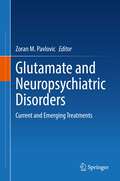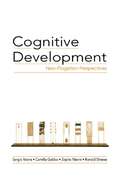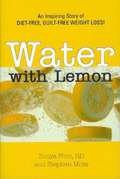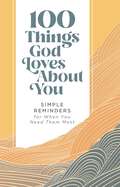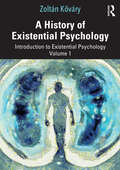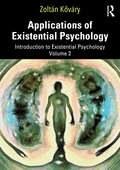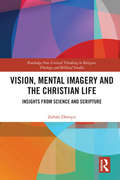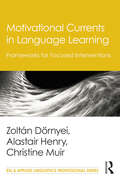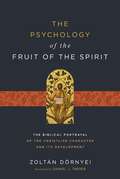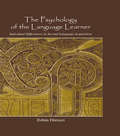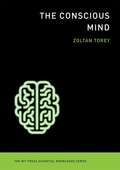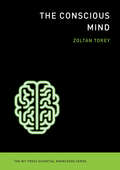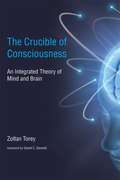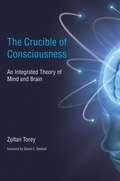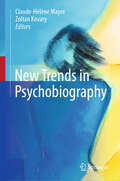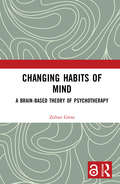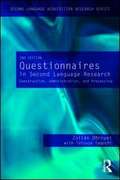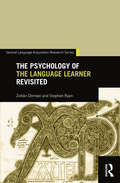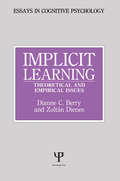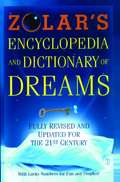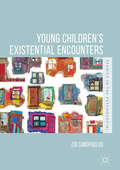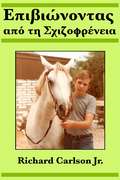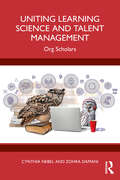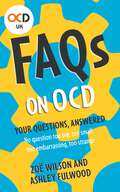- Table View
- List View
Glutamate and Neuropsychiatric Disorders: Current and Emerging Treatments
by Zoran M. PavlovicThis volume provides a comprehensive overview of recent advances in targeting glutamate signaling for the treatment of major psychiatric and neurological disorders. It draws on the latest findings in glutamate neurobiology and offers valuable insights into the application of translational principles in neuroscience drug discovery and development. In each chapter, glutamate as a neurotransmitter, its receptors and transporters, and their interplay with other neurotransmitters and neurotrophic factors, are discussed in the context of a specific, highly prevalent and disabling CNS disease. Most recent and detailed information is provided on Ischemic Stroke, Chronic Stress, Major Depressive Disorder, Bipolar Disorder, Autism Spectrum Disorders (ASD), Posttraumatic Stress Disorder (PTSD), Alzheimer’s Dementia, Schizophrenia, Impulsive Aggression, Substance Use Disorders (SUD), Amyotrophic Lateral Sclerosis (ALS), Chronic Pain, Multiple Sclerosis, Parkinson’s Disease, Attention Deficit Hyperactivity Disorder (ADHD), Migraine, Epilepsy and Anxiety disorders. Moreover, the book includes an extensive overview of glutamatergic treatments already available on the market, and those which are currently in pharmaceutical drug development pipelines. The primary beneficiaries will be neurology and psychiatry specialists and residents, neuroscientists, neuropharmacologists, pharmaceutical industry and clinical research organization professionals, academics, and clinicians working with psychiatric and neurological patients with comorbidities such as cardiologists, pulmonologists, and endocrinologists. This book will also appeal to psychiatry and neurology subspecialists and clinicians working in neuroscience labs seeking an easy-to-understand yet comprehensive overview of contemporary evidence-based clinical insights backed by basic science (preclinical) research evidence. Given its scope, the book is also a unique and indispensable resource for both preclinical and clinical neuroscientists, medical advisors, and clinical research specialists in the pharmaceutical industry. In addition, it will appeal to neuroscience and neuropsychopharmacology students and guide them through the complexities of glutamate involvement in the pathophysiology of the most common debilitating brain diseases with high unmet medical needs.
Cognitive Development: Neo-Piagetian Perspectives
by Sergio Morra Camilla Gobbo Zopito Marini Ronald SheeseTying together almost four decades of neo-Piagetian research, Cognitive Development provides a unique critical analysis and a comparison of concepts across neo-Piagetian theories. Like Piaget, neo-Piagetian theorists take a constructivist approach to cognitive development, are broad in scope, and assume that cognitive development is divided into stages with qualitative differences. Unlike Piaget, however, they define the increasing complexity of the stages in accordance with the child’s information processing system, rather than in terms of logical properties. This volume illustrates these characteristics and evidences the exciting possibilities for neo-Piagetian research to build connections both with other theoretical approaches such as dynamic systems and with other fields such as brain science. The opening chapter provides a historical orientation, including a critical distinction between the "logical" and the "dialectical" Piaget. In subsequent chapters the major theories and experimental findings are reviewed, including Pascual-Leone's Theory of Constructive Operators, Halford's structuralist theory, Fischer's dynamic systems approach to skills, Case's theory of Central Conceptual Structures, Siegler’s microgenetic approach, and the proposals of Mounoud and Karmiloff-Smith, as well as the work of others, including Demetriou and de Ribaupierre. The interrelation of emotional and cognitive development is discussed extensively, as is relevant non neo-Piagetian research on information processing. The application of neo-Piagetian research to a variety of topics including children's problem solving, psychometrics, and education is highlighted. The book concludes with the authors' views on possibilities for an integrated neo-Piagetian approach to cognitive development.
Water With Lemon
by Stephen Moss Zonya FocoPower of One Good Habit Water with Lemon is the first health novel in the Power of One Good Habit series. Introducing A New Genre: The Health Novel 60 extra pounds. An unhappy marriage. Food for comfort. Karen's life is falling apart. Then she meets an unlikely neighbor who reveals how a series of simple choices have the power to shape the life we have - into the life we want. Karen's story of weight loss and personal transformation will touch your heart and open your eyes! It will reveal how eight powerful, core habits, when mastered one at a time, create an invisible force that will literally - change your life. What do you get when you cross a nutritionist with a novelist? A health novel! Where nutrition, health and weight-loss information are woven into the story. Each challenge the characters face not only teaches you what to do - it inspires you to actually do it. Zonya Foco, America's Nutrition Leader, and Stephen Moss, America's Health Novelist, have joined forces to create this exciting new genre. Stephen's compelling story will keep you turning the pages while Zonya's surprisingly simple approach to mastering weight control is revealed. You'll discover that this is not another fad diet book. In fact, it's not a diet book at all. There is no diet mentality. Nothing to calculate. And never a reason to feel guilty!
100 Things God Loves About You: Simple Reminders for When You Need Them Most (A 100-Day Devotional)
by ZondervanDiscover that God's love for you is more than anything you could ask or imagine.With journaling space, Scripture quotes, and thoughtful devotions, 100 Things God Loves About You is the perfect gift book reminder of God's love for anyone feeling lonely, busy, or simply &“not enough&”--including you!There's no better feeling than knowing you are loved, yet many of us struggle to accept God's abundant, unconditional love for us. 100 Things God Loves About You includes 100 Bible verses and reflections about how high, how deep, and how wide God's love is for each of His children.This colorful gift book includes:100 encouraging things God loves about you--taken straight from the BibleJournaling space to write in "More Things God Loves About Me"A presentation page for memorable giftingA personalization page to write down what you love about a friend or family member 100 Things God Loves About You is an ideal gift for:Friends who are lonely with grief or isolationWomen and men who struggle to believe they are "good enough" for GodLoved ones facing illnessAnyone facing a time of transition or a difficult seasonNew high school and college graduatesChristmas, birthdays, Mother's Day, Father's Day, and more. "See what great love the Father has lavished on us!" writes the author of 1 John. Discover for the first time or the thousandth time that God's love for you is more than anything you could ask or imagine.
A History of Existential Psychology: Introduction to Existential Psychology Volume 1
by Zoltán KőváryThe first in a two-part set, this book takes a deep dive into the history and theory of existential psychology.Beginning with a discussion of the “existentialism and psychology problem,” the book presents the philosophical and historical roots of existential psychology. It introduces the most important philosophical schools in the development of existentialism and their creators, such as Kierkegaard, Nietzsche, Heidegger and Sartre, as well as the literary roots of existentialism in the writings of Dostoevsky and Kafka and the important contribution of psychoanalysis and phenomenological psychiatry. The book then goes on to look at the existential psychology schools, including daseinsanalysis, logotherapy and existential analysis, the existential-humanistic school and the existential-phenomenological school.Going beyond the questions of therapy and counseling that typically make up the study of existential psychology, the book offers the ultimate introduction for students and scholars of this fascinating and deeply rooted discipline. It may also interest professionals working in related fields.
Applications of Existential Psychology: Introduction to Existential Psychology Volume 2
by Zoltán KőváryThe second in a two-part set, this volume offers a detailed examination of the application of existential psychology.This book begins by looking at the "conditio humana" – the most important topics of existential psychology, including anxiety, freedom, choices, authenticity, suffering and meaning, creativity, togetherness, time and death. It then moves through the practical application of existential psychology in the context of dreams, research, pathology and therapy. Examining key theories, models and research, the volume offers a fascinating overview of how the disciplines of art, philosophy, literature, science and theology contribute to a deeper understanding of personal self-knowledge and a person’s sense of purpose. This unique transdisciplinary approach demonstrates how readers can apply philosophical, historical and artistic aspects of existential psychology to their lives. The book concludes by considering the role of existential psychology in the present.Going beyond the questions of therapy and counselling that typically make up the study of existential psychology, the book offers the ultimate introduction for students and scholars of this fascinating and deeply rooted discipline. It may also interest professionals working in related fields.
Vision, Mental Imagery and the Christian Life: Insights from Science and Scripture (Routledge New Critical Thinking in Religion, Theology and Biblical Studies)
by Zoltán DörnyeiThis book uniquely explores how the notion of vision is presented in modern science and the Bible, and how it can be applied to contemporary Christian contexts. The word "vision", our ability to see, has been described by an increasing body of scholarship in the social sciences as our capacity for mental imagery and imagination. As such, this unique cognitive capability has been utilised in many fields for a variety of purposes, from arts and psychotherapy to politics and business management, and even for performance enhancement in sports. The current book argues that a better understanding of vision can have far-reaching practical implications for Christian life and ministry by helping people to align themselves with God’s specific purposes. After a theoretical overview that integrates scientific and theological insights, the final chapters present a variety of strategies that can help believers to discern God’s call through the use of mental imagery and then to develop and cultivate the perceived vision. The book examines the scientific and biblical principles of vision in a comprehensive manner, with a special emphasis on the practical implications of the issue. As such, it will be of great interest to scholars of Theology, Biblical Studies and Church Growth/Leadership, as well as Organisational Behaviour, Business Management and Psychology.
Motivational Currents in Language Learning: Frameworks for Focused Interventions (ESL & Applied Linguistics Professional Series)
by Zoltán Dörnyei Alastair Henry Christine MuirBuilding on Zoltán Dörnyei’s authoritative work in the field of learner motivation, this book introduces a new conceptualization—Directed Motivational Currents (DMCs)—and sets out the defining aspects of what they are, what they are not, and how they are related to language learning motivation. Going beyond focused behavior in a single activity, DMCs concern intensive long-term motivation. The distinctive feature of the theory is that it views motivation not simply as a springboard for action but also as a uniquely self-renewing and sustainable process. It is this energizing capacity which distinguishes DMCs from almost every other motivational construct described in the research literature. Motivational Currents in Language Learning offers new insights, valuable both to motivation researchers and classroom practitioners. The accessible style, along with plentiful illustrations and practical suggestions for promoting sustained learning, invite readers to think about motivation in a different way. Highly relevant for language teachers, teachers-in-training, teacher educators, and researchers in TESOL and applied linguistics, the book explains how the DMC construct can be integrated into course structures and teaching methodologies, and encourages teachers to try out novel methods for harnessing motivational power in classroom settings.
The Psychology of the Fruit of the Spirit: The Biblical Portrayal of the Christlike Character and Its Development
by Zoltán DörnyeiFor centuries, the fruit of the Spirit has rightfully served as a wellspring of reflection on the virtues that epitomize the Christian life and character-building. However, the notion of the fruit of the Spirit is not limited solely to forming the biblical foundation of ethical living.Psychologist and theologian Zoltán Dörnyei argues that if we understand the nine attributes collectively as a concise portrayal of the ideal Christian self, this approach places the notion of the fruit of the Spirit at the intersection of several important theological themes, such as being conformed to the divine image, the gradual advancement of the kingdom of God, and new creation. In The Psychology of the Fruit of the Spirit, Dörnyei offers a scholarly exposition of the relevant theological content associated with the fruit of the Spirit. Complementing his theological reflections with findings from the field of psychology, he brings expertise in both psychology and theology to bear on this important biblical concept. His integrated perspective helps to uncover the full meaning and theological potential of the fruit of the Spirit by helping to clarify the nature of its nine facets, defining broader psychological dimensions that underlie the fruit, and offering practical lessons for cultivating it in the Christian life.
The Psychology of the Language Learner: Individual Differences in Second Language Acquisition (Second Language Acquisition Research Series)
by Zoltán DörnyeiResearch results over the past decades have consistently demonstrated that a key reason why many second language learners fail--while some learners do better with less effort--lies in various learner attributes such as personality traits, motivation, or language aptitude. In psychology, these attributes have traditionally been called "individual differences." The scope of individual learner differences is broad--ranging from creativity to learner styles and anxiety--yet there is no current, comprehensive, and unified volume that provides an overview of the considerable amount of research conducted on various language learner differences, until now.Each chapter in this new volume focuses on a different individual difference variable. Besides a review of the relevant second language literature, Zoltán Dörnyei presents a concise overview of the psychological research involving each topic. A key concern for the author has been to define the various learner factors as measurable constructs and therefore the discussion includes a summary of the most famous tests and questionnaires in each domain.A wide range of readers will benefit from this book--students in linguistics, applied linguistics, modern languages, and psychology programs; second language teachers participating in in-service training courses; and researchers in second language acquisition and psychology.
The Conscious Mind
by Zoltan ToreyHow did the human mind emerge from the collection of neurons that makes up the brain? How did the brain acquire self-awareness, functional autonomy, language, and the ability to think, to understand itself and the world? In this volume in the Essential Knowledge series, Zoltan Torey offers an accessible and concise description of the evolutionary breakthrough that created the human mind. Drawing on insights from evolutionary biology, neuroscience, and linguistics, Torey reconstructs the sequence of events by which Homo erectus became Homo sapiens. He describes the augmented functioning that underpins the emergent mind -- a new ("off-line") internal response system with which the brain accesses itself and then forms a selection mechanism for mentally generated behavior options. This functional breakthrough, Torey argues, explains how the animal brain's "awareness" became self-accessible and reflective -- that is, how the human brain acquired a conscious mind. Consciousness, unlike animal awareness, is not a unitary phenomenon but a composite process. Torey's account shows how protolanguage evolved into language, how a brain subsystem for the emergent mind was built, and why these developments are opaque to introspection. We experience the brain's functional autonomy, he argues, as free will. Torey proposes that once life began, consciousness had to emerge -- because consciousness is the informational source of the brain's behavioral response. Consciousness, he argues, is not a newly acquired "quality," "cosmic principle," "circuitry arrangement," or "epiphenomenon," as others have argued, but an indispensable working component of the living system's manner of functioning.
The Conscious Mind (The MIT Press Essential Knowledge series)
by Zoltan ToreyAn account of the emergence of the mind: how the brain acquired self-awareness, functional autonomy, the ability to think, and the power of speech.How did the human mind emerge from the collection of neurons that makes up the brain? How did the brain acquire self-awareness, functional autonomy, language, and the ability to think, to understand itself and the world? In this volume in the Essential Knowledge series, Zoltan Torey offers an accessible and concise description of the evolutionary breakthrough that created the human mind.Drawing on insights from evolutionary biology, neuroscience, and linguistics, Torey reconstructs the sequence of events by which Homo erectus became Homo sapiens. He describes the augmented functioning that underpins the emergent mind—a new (“off-line”) internal response system with which the brain accesses itself and then forms a selection mechanism for mentally generated behavior options. This functional breakthrough, Torey argues, explains how the animal brain's “awareness” became self-accessible and reflective—that is, how the human brain acquired a conscious mind. Consciousness, unlike animal awareness, is not a unitary phenomenon but a composite process. Torey's account shows how protolanguage evolved into language, how a brain subsystem for the emergent mind was built, and why these developments are opaque to introspection. We experience the brain's functional autonomy, he argues, as free will.Torey proposes that once life began, consciousness had to emerge—because consciousness is the informational source of the brain's behavioral response. Consciousness, he argues, is not a newly acquired “quality,” “cosmic principle,” “circuitry arrangement,” or “epiphenomenon,” as others have argued, but an indispensable working component of the living system's manner of functioning.
The Crucible of Consciousness
by Daniel C. Dennett Zoltan ToreyIn The Crucible of Consciousness, Zoltan Torey offers a theory of the mind and its central role in evolution. He traces the evolutionary breakthrough that rendered the brain accessible to itself and shows how the mind-boosted brain works. He identifies what it is that separates the human's self-reflective consciousness from mere animal awareness, and he maps its neural and linguistic underpinnings. And he argues, controversially, that the neural technicalities of reflective awareness can be neither algorithmic nor spiritual--neither a computer nor a ghost in the machine. The human mind is unique; it is not only the epicenter of our knowledge but also the outer limit of our intellectual reach. Not to solve the riddle of the self-aware mind, writes Torey, goes against the evolutionary thrust that created it. Torey proposes a model that brings into a single focus all the elements that make up the puzzle: how the brain works, its functional components and their interactions; how language evolved and how syntax evolved out of the semantic substrate by way of neural transactions; and why the mind-endowed brain deceives itself with entelechy-type impressions. Torey first traces the language-linked emergence of the mind, the subsystem of the brain that enables it to be aware of itself. He then explores this system: how consciousness works, why it is not transparent to introspection, and what sense it makes in the context of evolution. The "consciousness revolution" and the integrative focus of neuroscience have made it possible to make concrete formerly mysterious ideas about the human mind. Torey's model of the mind is the logical outcome of this, highlighting a coherent and meaningful role for a reflectively aware humanity.
The Crucible of Consciousness: An Integrated Theory of Mind and Brain
by Zoltan ToreyAn interdisciplinary examination of the evolutionary breakthroughs that rendered the brain accessible to itself.In The Crucible of Consciousness, Zoltan Torey offers a theory of the mind and its central role in evolution. He traces the evolutionary breakthrough that rendered the brain accessible to itself and shows how the mind-boosted brain works. He identifies what it is that separates the human's self-reflective consciousness from mere animal awareness, and he maps its neural and linguistic underpinnings. And he argues, controversially, that the neural technicalities of reflective awareness can be neither algorithmic nor spiritual—neither a computer nor a ghost in the machine. The human mind is unique; it is not only the epicenter of our knowledge but also the outer limit of our intellectual reach. Not to solve the riddle of the self-aware mind, writes Torey, goes against the evolutionary thrust that created it. Torey proposes a model that brings into a single focus all the elements that make up the puzzle: how the brain works, its functional components and their interactions; how language evolved and how syntax evolved out of the semantic substrate by way of neural transactions; and why the mind-endowed brain deceives itself with entelechy-type impressions. Torey first traces the language-linked emergence of the mind, the subsystem of the brain that enables it to be aware of itself. He then explores this system: how consciousness works, why it is not transparent to introspection, and what sense it makes in the context of evolution. The “consciousness revolution” and the integrative focus of neuroscience have made it possible to make concrete formerly mysterious ideas about the human mind. Torey's model of the mind is the logical outcome of this, highlighting a coherent and meaningful role for a reflectively aware humanity.
New Trends in Psychobiography
by Claude-Hélène Mayer Zoltan KovaryThis volume offers insights into contemporary trends and perspectives in psychobiographical research. It applys new theoretical and methodological frameworks and presents discourses on psychobiography from transdisciplinary backgrounds and various socio-cultural contexts, displaying the new state-of-the-art, new trends and themes in psychobiography. The book outlines psychobiography’s outstanding contribution to psychology from 36 internationally reputable authors. It also presents the ideas of five outstanding psychobiographers through interview excerpts. This book is a must for researchers, lecturers and practitioners in the field of psychology and social sciences interested in the use of new psychological theories and methodologies in life-span research.
Changing Habits of Mind: A Brain-Based Theory of Psychotherapy
by Zoltan GrossChanging Habits of Mind presents a theory of personality that integrates homeostatic dynamics of the brain with self-processes, emotionality, cultural adaptation, and personal reality. Informed by the author’s brain-based, relational psychotherapeutic practice, the book discusses the brain’s evolutionary growth, the four information-processing areas of the brain, and the cortex in relationship to the limbic system. Integrating the different experiences of sensory and non-sensory processes in the brain, the text introduces a theory of personality currently lacking in psychotherapy research that integrates neurobiology and psychology for the first time. Readers will learn how to integrate psychodynamic processes with cognitive behavioral techniques, while clinical vignettes exemplify the interaction of neurophysiological process with a range of psychological variables including homeostasis, developmental family dynamics, and culture. Changing Habits of Mind expands the psychotherapist’s perspective, exploring the important links between an integrated theory of personality and effective clinical practice.
Questionnaires in Second Language Research: Construction, Administration, and Processing
by Zoltan Dornyei Tatsuya TaguchiQuestionnaires in Second Language Research: Construction, Administration, and Processing is the first guide in the second language field devoted to the question of how to produce and use questionnaires as reliable and valid research instruments. It offers a thorough overview of the theory of questionnaire design, administration, and processing, made accessible by concrete, real-life second language research applications. This Second Edition features a new chapter on how an actual scientific instrument was developed using the theoretical guidelines in the book, and new sections on translating questionnaires and collecting survey data on the Internet. Researchers and students in second language studies, applied linguistics, and TESOL programs will find this book invaluable, and it can also be used as a textbook for courses in quantitative research methodology and survey research in linguistics, psychology, and education departments.
The Psychology of the Language Learner Revisited (Second Language Acquisition Research Series)
by Zoltan Dornyei Stephen RyanOver the past decade, the focus of inquiry into the psychology of SLA has shifted from the analysis of various characteristics within individuals towards a greater consideration of individuals’ dynamic interactions with diverse contexts. This revisit of the bestselling The Psychology of the Language Learner reflects on these developments by challenging some of the assumptions upon which the original text was based, maintaining the familiar structure of the original, while situating the discussion within a very different theoretical framework. Written in a lively, accessible style, the book considers how the field has evolved and maintains a keen eye on the future, suggesting exciting new directions for the psychology of SLA. The Psychology of the Language Learner Revisited will appeal to students and researchers in a wide range of disciplines, including applied linguistics, second language acquisition, modern languages, and psychology.
Implicit Learning: Theoretical and Empirical Issues (Essays in Cognitive Psychology)
by Zoltan Dienes Dianne C. BerryThere is considerable debate over the extent to which cognitive tasks can be learned non-consciously or implicitly. In recent years a large number of studies have demonstrated a discrepancy between explicit knowledge and measured performance. This book presents an overview of these studies and attempts to clarify apparently disparate results by placing them in a coherent theoretical framework. It draws on evidence from neuropsychological and computational modelling studies as well as the many laboratory experiments.Chapter one sets out the background to the large number of recent studies on implicit learning. It discusses research on implicit memory, perception without awareness, and automaticity. It attempts to set the implicit - explicit distinction in the context of other relevant dichotomies in the literature. Chapter two presents an overview of research on the control of complex systems, from Broadbent (1977) through to the present day. It looks at the accessibility of control task knowledge, as well as whether there is any other evidence for a distinction between implicit and explicit modes of learning. Chapter three critically reviews studies claiming to show that people can acquire concepts without being verbally aware of the basis on which they are responding. It shows that concept formation can be implicit in some sense but not in others. Chapter four investigates the claim that people can learn sequential information in an implicit way. Chapter five looks at whether computational modelling can elucidate the nature of implicit learning. It examines the feasibility of different exemplar connectionist models in accounting for performance in concept learning, sequence learning, and control task experiments. Chapter six reviews evidence concerning dissociations between implicit and explicit knowledge in various neuropsychological syndromes. Finally, chapters seven and eight discuss the many practical and theoretical implications of the research.
Zolar's Encyclopedia and Dictionary of Dreams
by ZolarThe completely revised and updated edition of the classic, best-selling guide to dream interpretation In the first major revision of the encyclopedia that has sold half a million copies worldwide, Zolar, the acclaimed "Dean of Astrology" (The New Yorker), has created the indispensable bedside reference for today's dreamers, reflecting the changes that have affected our waking hours and inevitably influence the content and significance of the messages we receive while we sleep. Looking at new cultural trends, work and social patterns, technologies and means of communication, Zolar reveals the meanings of dreams about cell phones, computers, cyberspace, beepers and much more. His concise and incisive explanations of such classic dreams as meeting a redheaded stranger, flying without wings and trying to comfort a crying baby are here as well, while obsolete subjects -- like girdles, gleaners and grenadiers -- have been eliminated. To complement each dream category a lucky number has been added for this new edition. With interpretations for more than 20,000 dreams, Zolar's Encyclopedia and Dictionary of Dreams offers you the opportunity to uncover the secrets hidden in your dreams and to act on the wisdom -- or respond to the warnings -- they contain.
Young Children’s Existential Encounters (Studies in the Psychosocial)
by Zoi SimopoulouThis book is a psychoanalytic observation of five children’s existential encounters in their ordinary life at the nursery. It is among the first within psychosocial literature to go beyond adult experiences and explore the existential in young children’s lives as it plays out in their everydayness in symbolic and sensory articulations and in relationship with others; including with the author as someone who arrived looking for it. The author offers analysis in the form of a writing inquiry into meaning, by means of an on-going movement between the self and the other, the interior and the exterior, and psychoanalytic and existential-phenomenological ideas. This is illustrated through a kaleidoscopic account of May, Nadia, Edward, Baba and Eilidhs’ encounters with nothingness, strangeness, ontological insecurity, death and selfhood as these emerged in the time they spent with the author embodying different forms – from concrete objects to dreams – exemplifying an attunement to existential ubiquity. With its relational ground, this work suggests the potential for adults – including researchers, therapists, trainees, educators and parents – to attune to their own existential encounters as a path to understanding those of children.
Επιβιώνοντας από τη Σχιζοφρένεια: Science Fiction In A Flash
by Richard Carlson Jr. Zoi KarampekiouΟ Ρίτσαρντ Κάρλσον Τζούνιορ διαγνώστηκε με παρανοϊκή σχιζοφρένεια όταν ήταν είκοσι ενός ετών. Η σύγχρονη ψυχιατρική απογοήτευσε τρομερά τον Ρίτσαρντ για παραπάνω από μία δεκαετία. Έπειτα από ένα περιστατικό με την αστυνομία, κατάλαβε πραγματικά ότι η διάγνωσή του ήταν αληθινή και άρχισε επιτέλους τη μακρά διαδικασία της ανάρρωσης. Πάνω από δέκα χρόνια μετά, η ζωή του έχει βελτιωθεί πολύ. Κατά τη θεραπεία του, ο Ρίτσαρντ ξεπέρασε επίσης την κατάθλιψη, την ψυχαναγκαστική διαταραχή και τον λήθαργο. Μην αφήσετε αυτό που συνέβη στον Ρίτσαρντ να συμβεί σε σας, σε κάποιο αγαπημένο σας πρόσωπο ή σ’ έναν ασθενή. Πάντα να είστε ειλικρινείς μεταξύ σας και με τον ψυχίατρό σας.
Uniting Learning Science and Talent Management: Org Scholars
by Cynthia Nebel Zohra DamaniThis book delves into the intricate relationship between the talent lifecycle and learning science, offering a fresh perspective on talent management. Through a meticulous exploration of talent acquisition, management, retention, and exits, it reveals how learning science can be harnessed to enhance organizational growth and employee satisfaction.Covering strategic talent sourcing, optimized onboarding, leadership development, and innovative retention strategies, the book presents evidence-based approaches to navigating the complexities of the talent cycle. It underscores the transformative power of learning science in creating sustainable talent experiences, processes, programs, and systems. Through real-world applications and theoretical insights, readers gain access to practical strategies for unlocking the true potential within organizations, making it an indispensable resource for talent leaders and HR professionals.Targeted at HR professionals, talent leaders, organizational developers, and academic researchers, this book serves as a comprehensive guide for those committed to fostering a culture of continuous learning and growth within their organizations. Its practical insights and evidence-based strategies are particularly valuable for professionals seeking to apply learning science principles to real-world challenges in the talent cycle.
FAQs on OCD
by Ashley Fulwood Zoe WilsonFOREWORD BY PROFESSOR PAUL SALKOVSKIS- You left the doctor's surgery before you could ask the things you really wanted to know.- You've googled your question about OCD and had 75 answers, all contradicting each other.- You asked your best friend - but they looked at you strangely.You have so many questions, but no idea where to start finding the answers. Here they are. In this book you'll find the definitive, expert responses to all your FAQs: On OCD. No question is too simple, too embarrassing, too rude or too offbeat to be included, and each one has been asked by thousands of people just like you.Will people judge me for my thoughts?Can hormones make OCD worse?Does anyone ruminate as much as me?All these questions, and hundreds more, are covered in this short but powerful, helpful, practical guide to managing your OCD. Read at your leisure, or dip in and out when you most need the support or to shine a light on the thoughts and feelings that are making you uncomfortable or unhappy, and to bring them out of the shadows so you can understand and accept them.
FAQs on OCD
by Ashley Fulwood Zoe WilsonFOREWORD BY PROFESSOR PAUL SALKOVSKIS- You left the doctor's surgery before you could ask the things you really wanted to know.- You've googled your question about OCD and had 75 answers, all contradicting each other.- You asked your best friend - but they looked at you strangely.You have so many questions, but no idea where to start finding the answers. Here they are. In this book you'll find the definitive, expert responses to all your FAQs: On OCD. No question is too simple, too embarrassing, too rude or too offbeat to be included, and each one has been asked by thousands of people just like you.Will people judge me for my thoughts?Can hormones make OCD worse?Does anyone ruminate as much as me?All these questions, and hundreds more, are covered in this short but powerful, helpful, practical guide to managing your OCD. Read at your leisure, or dip in and out when you most need the support or to shine a light on the thoughts and feelings that are making you uncomfortable or unhappy, and to bring them out of the shadows so you can understand and accept them.
